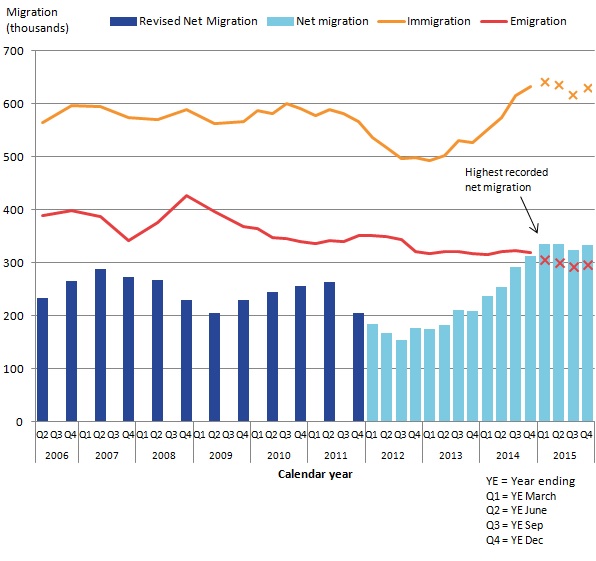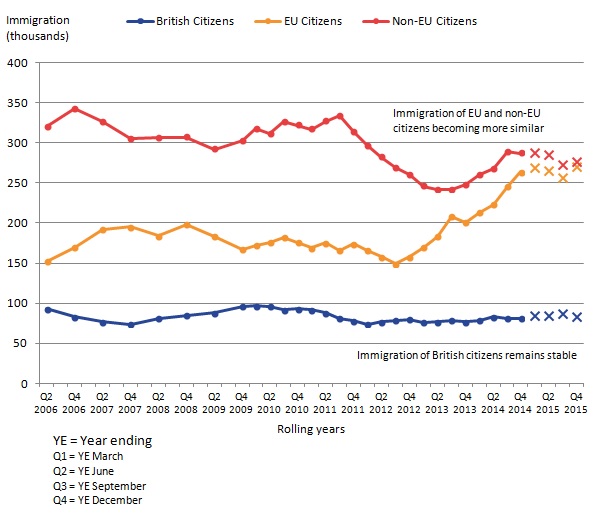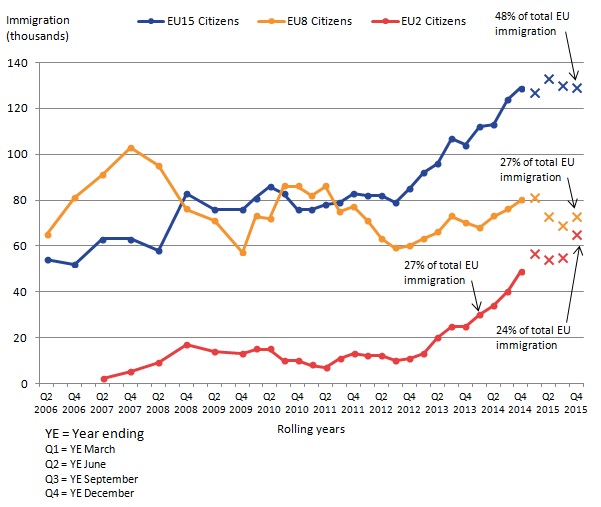Contribute
| EU Referendum - Immigration Analysis |
Anil Bhanot
06/16/2016
The EU Referendum is now predominantly about how the UK economy will fair under Brexit versus the impact of uncontrolled immigration under Remaining In. Here are some facts and figures.
Brexit argument:
The principal argument made by the Brexit camps centre around a concern that immigration has spiralled out of control, both in terms of numbers and with regard to the fact that the UK government is no longer in control of its borders as a result of EU membership.
In part this argument has been fuelled by increased levels of migration into the UK and in part by the fact the EU’s freedom of movement principal means that citizens of any other EU country have an automatic right to reside in the UK.
Data published by the Office of National Statistics (ONS) in May of this year shows that net-migration into the UK increased to 333,000 in 2015, increasing the potency of this argument. This figure signifies an increase of 20,000 from the previous year; of those 184,000 were EU citizens (10,000 more than the previous year), and 188,000 were from Non-EU (194,000 the previous year).
These latest figures are part of a trend noted over the last few years, whereby net migration has been steadily increasing.
The Brexit camp has also been quick to highlight that such figures demonstrate the Government’s inability to keep its election promise to significantly bring net-migration down. Although non-EU migration has consistently made up a bigger share of migration into the UK, it is the rise in EU migration which we cannot control. A particularly concerning issue when one looks at immigration figures and realises that these two figures are getting ever closer. Under current circumstances even if we were able to reduce non-EU migration further, the lack of control over EU migration could mean that net-migration can simply never be controlled.
As it stands there are currently an estimated 3 million EU citizens currently living in the UK; a number that will only grow if any of the proposed new entries into the Union are allowed to join. The only solution the Brexit camp sees to this problem is the introduction of an Australian style points system for EU immigrants. They argue this would considerably reduce the number of unskilled workers moving to the UK and ensure that the people who were coming were coming here to work as opposed to coming here and costing the UK money. Moreover, it would allow the UK to choose from amongst the brightest and best from across the world whilst still being able to reduce immigration; as opposed to having to accept ever growing numbers from the EU who would not meet the threshold for a visa if they had to meet the same requirements as non-EU citizens.
The issue of immigrants costing the UK is another problem the Brexit camp points to. The sheer number of people who are already in the UK, plus all the others who would likely come, put significant extra pressure on our services, in particular our schools and hospitals. They point to the fact that an extra 1.3 million people have been registered with GPs in the last three years, whilst A&E visitors increased by 59% between 2003 and 2015. Something which must be considered in a context of ever increased pressure on our services following the financial crisis.
In addition to the number of people coming in from the EU, we must also consider that these people are having babies in the UK; these babies are not counted in the immigration figures as they are UK born, but they add to the pressure on our services. Between 2004 and 2015 475,000 babies were born in the UK to EU mothers. This adds an estimated £1.33 billion in costs to the NHS.
Another hidden number in this migration picture that the Brexit camp points to is the number of refugees that they predict will head to the UK. The issue they are concerned with is not that the number of refugees the UK itself lets in will significantly grow, as the UK government has been fairy stringent in its assessment of who should be allowed entry into the UK during this enormous refuges crisis that is currently taking place, with millions of people displaced, in particular from Syria. The problem will come when the refugees that are entering other EU countries are granted citizenship in these countries; once this has happened all of these people as EU citizens will have the right to move to the UK. The Brexit camp believes that many of them will move to the UK once they have an opportunity to do this. As evidence of this they point to the case of Somalis.
Whilst other EU countries let in a higher percentage of Somalis when thousands fled persecution in that country and headed to Europe, the UK currently has the largest Somali born population in Europe, totalling 114,000. In part the reason for this has been
the fact that once granted citizenship, in particular in the Netherlands and Scandinavia, these people then moved to the UK. Since the year 2000 it is thought that about 20,000 Somalis have moved from the Netherlands to the UK; whilst between 2003 and 2004 around 4,000 moved to the UK from Denmark. As part of their rationale for doing so a number of reasons have been sited, including the perception that it will be easier to find work in the UK and that the UK is a more open society where they will not face discrimination.
Besides adding to the number of potential immigrants who will come to the UK the Brexit camp also considers this an issue which could threaten our security. The UK can screen those it allows into the country as carefully as it wants, so long as they are not EU citizens. In the case of them being EU citizens they are simply allowed in, even in the case of convicted criminals. Moreover, the sheer number of people entering the UK means that it is harder for all the necessary checks to be carried out correctly, as there is added pressure on the system.
The security concerns are particularly worrying when related to terrorism. Terrorists who travel to places such as Syria re-enter the EU via a member state that may not have the same security measures in places as the UK; once back in the EU they can move within the region freely. Moreover, when a EU citizen is flagged up on a terrorist watchlist they cannot be automatically deported from the UK, in according to rulings by the European Court of Justice.
Remain argument:
Before assessing the main arguments regarding immigration from those who believe that we should stay in the EU it should also be noted that some of the claims made by Brexit are disputed by this side.
Regarding the increase in immigration it should be noted that the increase from 2014 to 2015 is actually not considered statistically significant by the Office of National Statistics (ONS). It should also be pointed out that despite the fact that the Brexit camp emphasises migration from the newer EU member states, in reality the vast majority of EU migrants are not from these countries.
This, of course, must be coupled with the fact that the majority of migrants coming to the UK still are from outside of the European Union.
The Remain camp also argues that those from Brexit have been trying to mislead people by emphasising the cost of EU migrants to the UK. Instead of looking at these costs the Remain side points to figures that suggest that the UK actually benefits financially from the people who come here.
2.1 million out of the estimated 3 million EU citizens who live in the UK are employed; this is thought to boost the UK workforce by about 0.5% a year. EU citizens who move to the UK tend to come for work related reasons, this includes the EU2 citizens from Bulgaria and Romania of whom the Brexit camp is particularly critical. Of the EU2 citizens who came in the year ending December 2015, 84% came for work related reasons; with 60% arriving with a definite job to go to.
Besides boosting the workforce and so providing revenue in that way it is also calculated that EU citizens make a positive fiscal contribution to the UK, in other words, they pay more in taxes than they receive in benefits. Those that have arrived in the UK since 2000 are estimated to have contributed £20 billion to UK public finances between 2001 and 2011. During this time period immigrants from the EU-15 countries (those that joined before 2004) contributed 64% more in tax than they received in benefits; whilst those from the EU10 countries contributed 12% more than they received. Moreover, immigrants who arrived since 2000 were 43% less likely than the native population to receive state benefits and tax credits and 7% less likely to live in social housing. These
people who come and settle in the UK are also more educated than the native population (in 2011, 25% of immigrants from A10 countries and 62% of those from EU-15 countries had a university degree, while the comparable share is 24% among natives) and have higher employment rates (81% for A10, 70% for EU-15 and 70% for UK natives in 2011).
Besides any arguments related to immigration made by either side the Remain campaign is also quick to point out that it does not actually believe that leaving the EU would bring down immigration in the UK. If the UK wants to remain in the single market and benefit from free trade with the EU, which it most likely will want to as otherwise the economic consequences could be detrimental, then it would have to sign an agreement with the EU akin to those signed by Norway and Switzerland. Irrespective of such an agreement being the most favourable Brexit scenario, the Treasury still estimates that the cost to GDP per household would be £2,600 a year. Although not members of the EU these two countries have access to the markets, the trade off, though, is that the free movement of people still applies in these countries. The percentage of the population made up of EU citizens in Switzerland is in fact much higher than in the UK.
It is also important to look at the situation in other EU countries before presuming that any problems are accounted for by our membership. The UK ranks 10th of 28 countries in terms of foreign population. Many other EU countries have a higher percentage of foreign born nationals, whilst many others have far fewer. Whilst the world over populations are growing other EU countries are estimated to have much smaller population increases than the UK. When we consider that other EU members, including ones with attractive welfare systems and considerable economies such as Germany, will not experience the same population increases and number of immigrants as the UK, we must focus beyond the EU if we are really to bring down immigration; to blame the EU is a simplistic solution and to believe that by leaving the Union the problem will be immediately solved seems incredibly short sighted.


You may also access this article through our web-site http://www.lokvani.com/


